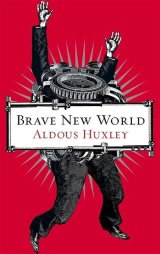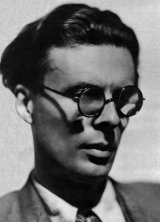Brave New World Page #5
Odd, original and irreverent, Aldous Huxley's tour de force is a darkly satiric vision of a "utopian" future --where humans are genetically bred and pharmaceutically anesthetized to passively serve a ruling order. A powerful and thought-provoking classic of speculative fiction, Brave New World is entertaining, fascinating, and terrifying all at the same time and remains remarkably relevant to this day as a warning to be heeded as we head into tomorrow.
"Observe," said the Director triumphantly, "observe." Books and loud noises, flowers and electric shocks–already in the infant mind these couples were compromisingly linked; and after two hundred repetitions of the same or a similar lesson would be wedded indissolubly. What man has joined, nature is powerless to put asunder. "They'll grow up with what the psychologists used to call an 'instinctive' hatred of books and flowers. Reflexes unalterably conditioned. They'll be safe from books and botany all their lives." The Director turned to his nurses. "Take them away again." Still yelling, the khaki babies were loaded on to their dumb-waiters and wheeled out, leaving behind them the smell of sour milk and a most welcome silence. One of the students held up his hand; and though he could see quite well why you couldn't have lower-cast people wasting the Community's time over books, and that there was always the risk of their reading something which might undesirably decondition one of their reflexes, yet … well, he couldn't understand about the flowers. Why go to the trouble of making it psychologically impossible for Deltas to like flowers? Patiently the D.H.C. explained. If the children were made to scream at the sight of a rose, that was on grounds of high economic policy. Not so very long ago (a century or thereabouts), Gammas, Deltas, even Epsilons, had been conditioned to like flowers–flowers in particular and wild nature in general. The idea was to make them want to be going out into the country at every available opportunity, and so compel them to consume transport. "And didn't they consume transport?" asked the student. "Quite a lot," the D.H.C. replied. "But nothing else." Primroses and landscapes, he pointed out, have one grave defect: they are gratuitous. A love of nature keeps no factories busy. It was decided to abolish the love of nature, at any rate among the lower classes; to abolish the love of nature, but not the tendency to consume transport. For of course it was essential that they should keep on going to the country, even though they hated it. The problem was to find an economically sounder reason for consuming transport than a mere affection for primroses and landscapes. It was duly found. "We condition the masses to hate the country," concluded the Director. "But simultaneously we condition them to love all country sports. At the same time, we see to it that all country sports shall entail the use of elaborate apparatus. So that they consume manufactured articles as well as transport. Hence those electric shocks." "I see," said the student, and was silent, lost in admiration. There was a silence; then, clearing his throat, "Once upon a time," the Director began, "while our Ford was still on earth, there was a little boy called Reuben Rabinovitch. Reuben was the child of Polish-speaking parents." The Director interrupted himself. "You know what Polish is, I suppose?" "A dead language." "Like French and German," added another student, officiously showing off his learning. "And 'parent'?" questioned the D.H.C. There was an uneasy silence. Several of the boys blushed. They had not yet learned to draw the significant but often very fine distinction between smut and pure science. One, at last, had the courage to raise a hand. "Human beings used to be …" he hesitated; the blood rushed to his cheeks. "Well, they used to be viviparous." "Quite right." The Director nodded approvingly. "And when the babies were decanted …" "'Born,'" came the correction. "Well, then they were the parents–I mean, not the babies, of course; the other ones." The poor boy was overwhelmed with confusion. "In brief," the Director summed up, "the parents were the father and the mother." The smut that was really science fell with a crash into the boys' eye-avoiding silence. "Mother," he repeated loudly rubbing in the science; and, leaning back in his chair, "These," he said gravely, "are unpleasant facts; I know it. But then most historical facts are unpleasant." He returned to Little Reuben–to Little Reuben, in whose room, one evening, by an oversight, his father and mother (crash, crash!) happened to leave the radio turned on. ("For you must remember that in those days of gross viviparous reproduction, children were always brought up by their parents and not in State Conditioning Centres.") While the child was asleep, a broadcast programme from London suddenly started to come through; and the next morning, to the astonishment of his crash and crash (the more daring of the boys ventured to grin at one another), Little Reuben woke up repeating word for word a long lecture by that curious old writer ("one of the very few whose works have been permitted to come down to us"), George Bernard Shaw, who was speaking, according to a well-authenticated tradition, about his own genius. To Little Reuben's wink and snigger, this lecture was, of course, perfectly incomprehensible and, imagining that their child had suddenly gone mad, they sent for a doctor. He, fortunately, understood English, recognized the discourse as that which Shaw had broadcasted the previous evening, realized the significance of what had happened, and sent a letter to the medical press about it. "The principle of sleep-teaching, or hypnopædia, had been discovered." The D.H.C. made an impressive pause. The principle had been discovered; but many, many years were to elapse before that principle was usefully applied. "The case of Little Reuben occurred only twenty-three years after Our Ford's first T-Model was put on the market." (Here the Director made a sign of the T on his stomach and all the students reverently followed suit.) "And yet …" Furiously the students scribbled. "Hypnopædia, first used officially in A.F. 214. Why not before? Two reasons. (a) …" "These early experimenters," the D.H.C. was saying, "were on the wrong track. They thought that hypnopædia could be made an instrument of intellectual education …" (A small boy asleep on his right side, the right arm stuck out, the right hand hanging limp over the edge of the bed. Through a round grating in the side of a box a voice speaks softly. "The Nile is the longest river in Africa and the second in length of all the rivers of the globe. Although falling short of the length of the Mississippi-Missouri, the Nile is at the head of all rivers as regards the length of its basin, which extends through 35 degrees of latitude …" At breakfast the next morning, "Tommy," some one says, "do you know which is the longest river in Africa?" A shaking of the head. "But don't you remember something that begins: The Nile is the …" "The - Nile - is - the - longest - river - in - Africa - and - the - second - in - length - of - all - the - rivers - of - the - globe …" The words come rushing out. "Although - falling - short - of …" "Well now, which is the longest river in Africa?" The eyes are blank. "I don't know."
Translation
Translate and read this book in other languages:
Select another language:
- - Select -
- 简体中文 (Chinese - Simplified)
- 繁體中文 (Chinese - Traditional)
- Español (Spanish)
- Esperanto (Esperanto)
- 日本語 (Japanese)
- Português (Portuguese)
- Deutsch (German)
- العربية (Arabic)
- Français (French)
- Русский (Russian)
- ಕನ್ನಡ (Kannada)
- 한국어 (Korean)
- עברית (Hebrew)
- Gaeilge (Irish)
- Українська (Ukrainian)
- اردو (Urdu)
- Magyar (Hungarian)
- मानक हिन्दी (Hindi)
- Indonesia (Indonesian)
- Italiano (Italian)
- தமிழ் (Tamil)
- Türkçe (Turkish)
- తెలుగు (Telugu)
- ภาษาไทย (Thai)
- Tiếng Việt (Vietnamese)
- Čeština (Czech)
- Polski (Polish)
- Bahasa Indonesia (Indonesian)
- Românește (Romanian)
- Nederlands (Dutch)
- Ελληνικά (Greek)
- Latinum (Latin)
- Svenska (Swedish)
- Dansk (Danish)
- Suomi (Finnish)
- فارسی (Persian)
- ייִדיש (Yiddish)
- հայերեն (Armenian)
- Norsk (Norwegian)
- English (English)
Citation
Use the citation below to add this book to your bibliography:
Style:MLAChicagoAPA
"Brave New World Books." Literature.com. STANDS4 LLC, 2025. Web. 23 Feb. 2025. <https://www.literature.com/book/brave_new_world_2066>.








Discuss this Brave New World book with the community:
Report Comment
We're doing our best to make sure our content is useful, accurate and safe.
If by any chance you spot an inappropriate comment while navigating through our website please use this form to let us know, and we'll take care of it shortly.
Attachment
You need to be logged in to favorite.
Log In